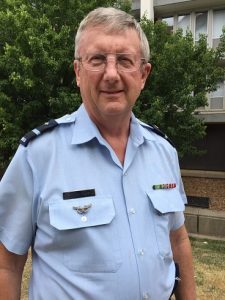Let everything that breathes praise the LORD
Chaplain Kevin Russell

Psalm 150
1 Praise the Lord!
Praise God in his sanctuary;
praise him in his mighty firmament!
2 Praise him for his mighty deeds;
praise him according to his surpassing greatness!
3 Praise him with trumpet sound;
praise him with lute and harp!
4 Praise him with tambourine and dance;
praise him with strings and pipe!
5 Praise him with clanging cymbals;
praise him with loud clashing cymbals!
6 Let everything that breathes praise the Lord!
Praise the Lord!
I am approaching the end of my time as a member of the Permanent Air Force and my tenure as the Director-General Chaplaincy – Air Force; I will transfer to the RAAF Specialist Reserve in the New Year. I have appreciated the presence of Military Christian Fellowship (MCF) and like groups over the years.
My previous Crossfire articles have mainly focussed on a psalm. This time I would like to focus on the last of the psalms, Psalm 150. This psalm offers motivation for us to praise God’s strength and the abundance of his greatness, praising God for his strength and the abundance of his greatness is an ever-timely motivation.
I joined the Air Force as a Chaplain towards the end of 1987. I was an assistant minister at the Anglican Church in Richmond, NSW. During my time at that church, I met a number of Defence members and families associated with RAAF Richmond. I also met a RAAF Chaplain and was introduced to the ministry of MCF. In 1987, MCF at RAAF Richmond held a very sharp half-hour mid-week service in the chapel, and conducted four evening Bible study groups in the Hawkesbury area. Most excitedly, many people came to know Jesus through this ministry.
Psalm 150 is the climax of a great doxology, and a fitting conclusion to the whole the five books of psalms. This particular psalm, on the surface, seems to be light on content, but is packed with an impressive array of musical instruments. The musical instruments remind us that this psalm, and the other psalms, was sung. The psalms appeal to more than our intellect; they arouse our emotions and stimulate our imagination as well as appeal to our wills.
Most often when we think of the psalms, we think of crying out to God in pain, fear or grief. We think of the situations that we find ourselves in and find solace through reading and praying the psalms. Most of us have a favourite psalm that is the result of comfort we found in a time of deep personal pain.
Such psalms are psalms of lament. Laments are prayers of people who are suffering, but who are not acquiescing to their suffering. Those who suffer voice their complaints to God in the strongest terms, even asking for retribution against those who bring them harm. On a number of occasions, they even accuse God of betrayal (eg. Ps 77:7-9). I take heart from these psalms. These psalms represent people who are not grumbling against God, but are complaining directly to God. The Bible invites us to complain to God, and most of the psalms of lament turn to praise.
There is also a shift in the style of psalms throughout the collection. Towards the end, there are more psalms of praise, indicating that there is a movement from lament to joy. This can only happen because a person comes to terms emotionally, psychologically, dramatically and theologically with the sovereign reality of God. The key here is the realisation that we have a loving God who is faithful to his promises to us.
Jesus himself taught that the psalms themselves pointed to him (e.g. Luke 24:44). We can praise God anywhere in intimate fellowship because “the Word became flesh and made his dwelling amongst us” (John 1:14).
Many of us, at the point of our conversion to Jesus Christ, often reflect on the demonstration of God’s strength and greatness in his victory over sin and death, in the crucifixion, resurrection and ascension of Jesus.
We all face difficulties in life. At times we do suffer and are full of grief. This suffering maybe the result of our own wrong-doing, or it might be because something as happened to us. We may also be grieving a changing world, which rejects or thinks differently about the things that we hold most dear.
I am heartened by the efforts of Defence Christians, who seek to maintain a presence, knowing that we work in a secular environment that is pluralistic in nature. Three significant events stand out to me: The annual Defence Christians Dinner, the National Day of Prayer activities and the MCF Seminar. These are very encouraging activities that act to remind us that Christians serve Christ, knowing deep down, that our God is sovereign.
Even though I did not necessarily feel it, I know that God has sustained me over the years.
The words of Psalm 150:6 are apt, “Let everything that breaths praise the LORD!”
This article is also published in the Nov 2017 edition of Crossfire magazine. To gain a copy of the full magazine please digitally access it here or contact the MCF Office to request physical copies.
 others in the ADF and the wider Christian community. Please consider how you can support us through prayer, finances and getting involved in the MCF community.
others in the ADF and the wider Christian community. Please consider how you can support us through prayer, finances and getting involved in the MCF community.